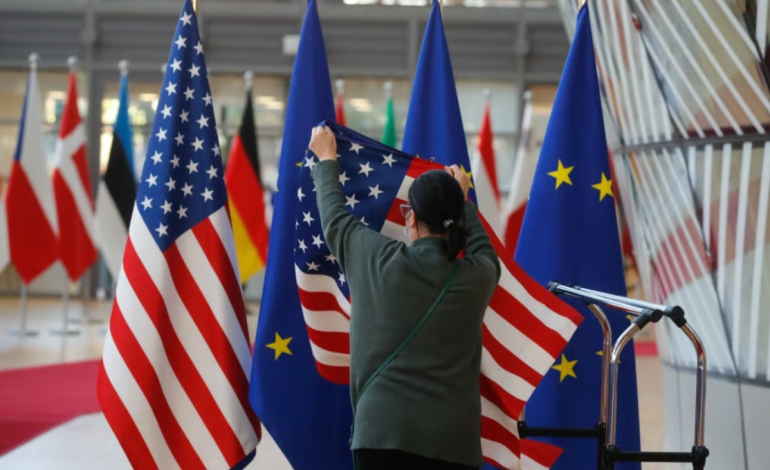The return of Donald Trump to the White House has reignited concerns across Europe about its deep reliance on US digital infrastructure—particularly American-dominated cloud services—which some experts warn could be used as geopolitical leverage, Politico reports.
As tensions rise in global politics and US trade policies shift, European leaders and industry insiders are expressing unease over a scenario once considered remote: the possibility that US authorities could limit or even halt digital services to Europe.
The vulnerability lies in Europe’s dependence on three major American cloud providers—Amazon Web Services, Microsoft Azure, and Google Cloud—which collectively control over two-thirds of the region’s cloud computing market. These platforms are critical for a wide array of services, from business operations and public sector communications to defense systems and personal digital activity.
“There is a serious risk that our data could be used by the US administration or that infrastructure could become inaccessible due to political decisions,” said German MEP Matthias Ecke during a recent panel on digital sovereignty.
The issue came into sharper focus in May when Karim Khan, the International Criminal Court’s chief prosecutor, reportedly lost access to his Microsoft-hosted email following US sanctions. While Microsoft stated it had not ceased services to the ICC, the event amplified fears that American companies may be compelled to comply with political decisions from Washington—even in international legal matters.
Some European officials and cloud providers are now openly questioning whether such access to critical infrastructure should remain in the hands of foreign governments.
“Cloud is like a tap of water,” said Benjamin Revcolevschi, CEO of France’s OVHcloud. “What if at some moment the tap is closed?”
In response to growing anxiety, US tech companies have taken steps to reassure European customers. Microsoft announced it would include legal clauses in contracts with European governments to fight suspension orders in court and introduced new features aimed at protecting data access. Amazon has outlined governance models to ensure continued service under a so-called “sovereign cloud” framework.
Still, experts remain skeptical about how much resistance these firms could offer in the face of direct orders from the US government.
“If that political dimension turns hostile, how credible is it that companies with the best intentions can challenge their president?” said Cristina Caffarra, an economist and policy expert at University College London.
Amid these concerns, European policymakers are accelerating calls for a homegrown digital infrastructure. The “EuroStack” initiative, a €300 billion proposal backed by tech leaders and economists, aims to reduce dependence on US platforms by promoting European-built alternatives across cloud services, AI, and data centers. The project emphasizes three core goals: “Buy European,” “Sell European,” and “Fund European.”
The idea is gaining traction. France has voiced strong support, and the concept was included in Germany’s recent coalition agreement. However, critics note the plan faces significant financial and political hurdles.
“It’s asking a lot of money. The idea that it’s going to magically appear is pretty fanciful,” said Zach Meyers of the Brussels-based think tank CERRE.
A more immediate challenge lies in managing Europe’s relationship with the US while seeking greater technological autonomy. One proposal under review in Brussels involves a cloud security label that could exclude providers subject to foreign laws, like the US CLOUD Act. But the initiative has stalled amid lobbying from Washington and internal divisions within the EU.
France has been vocal in supporting the label as a means of shielding European data. The Netherlands, previously opposed, is reportedly reconsidering its stance in light of recent political developments.
The European Commission’s newly appointed tech sovereignty chief, Henna Virkkunen, acknowledged in June that the region is at risk of its dependencies being “weaponized” and has pledged to strengthen local capabilities.
Despite reassurances from US tech leaders that a service cutoff is “exceedingly unlikely,” the growing chorus of warnings suggests a shift in European thinking.
“Europe blindly trusted the US to always be there, and always on their side,” said Francesca Bria, professor of innovation at University College London. “The situation feels very different now.”










The latest news in your social feeds
Subscribe to our social media platforms to stay tuned